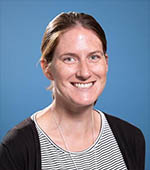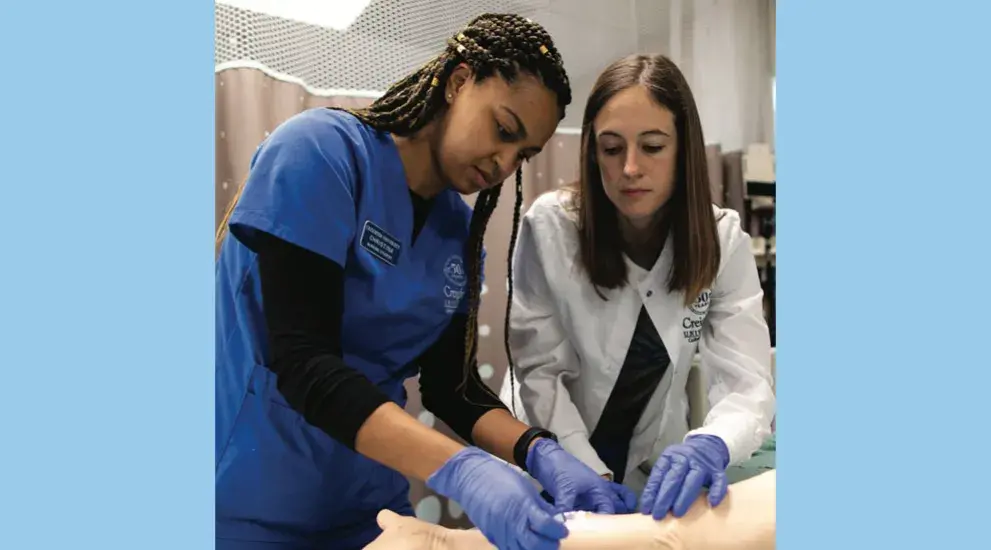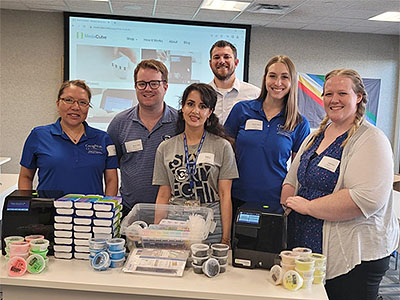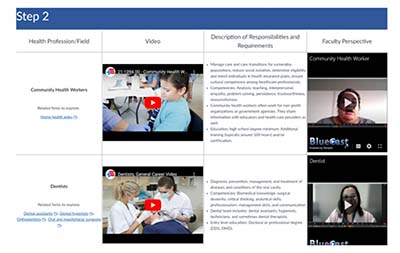
End of Year Report
A Look Forward
The growing importance of interprofessional practice and education for healthcare providers places the work of Creighton University’s Center for Interprofessional Practice, Education and Research at the forefront of progress.
The following report reflects on CIPER’s 2022-2023 year while simultaneously focusing on the exceptional team of leaders that is preparing our students for the rapidly emerging world of interprofessional care.
Letter From the Director
 I am delighted to present to you the End of Year Report from the Center for Interprofessional Practice, Education, & Research (CIPER). The past year has been an exciting one, as Creighton University has made significant investments in the interprofessional learning environment and improving the health of our communities. To be prepared for this holistic approach to health care, our graduates must learn collaborative skills. Our exceptional team has made great contributions to this field, demonstrating our commitment to values of social justice, health equity, and the integration of humanities in education.
I am delighted to present to you the End of Year Report from the Center for Interprofessional Practice, Education, & Research (CIPER). The past year has been an exciting one, as Creighton University has made significant investments in the interprofessional learning environment and improving the health of our communities. To be prepared for this holistic approach to health care, our graduates must learn collaborative skills. Our exceptional team has made great contributions to this field, demonstrating our commitment to values of social justice, health equity, and the integration of humanities in education.
One of our significant achievements is the launch of our new journal, the Creighton Journal of Collaborative Practice & Education (CJCPE). This platform serves as a scholarly avenue for those advancing interprofessional or interdisciplinary practice and education by featuring peer-reviewed articles and reports that focus on the improvement of health care delivery, quality, and access. We hope this open-access resource proves beneficial for those new to publication or willing to share innovations in education and practice.
Our active participation in key interprofessional groups, such as the National Academies of Practice, All Together Better Health, Interprofessional Education Collaborative (IPEC), and the American Interprofessional Health Collaborative (AIHC), demonstrates our dedication to staying at the forefront of advancements in the field. By engaging with these influential organizations through membership and leadership, CIPER contributes to shaping the future of interprofessional education and collaboration on a national and international level.
Looking ahead, we are focused on enhancing our curriculum to reflect best practices and incorporating the latest updates in the field. Please be on the lookout for our growing opportunities to participate in interprofessional faculty development and research. Furthermore, we are excited to announce that Creighton has been named a cohost of the international conference, Collaborative Across Borders (CAB IX), in May of 2025 with UNMC. Being chosen as cohosts for this conference is an affirmation of UNMC and Creighton’s national IPE leadership roles, and we are excited to showcase the Nebraska community.
These initiatives underscore our commitment to creating impactful learning experiences and fostering collaboration among diverse professionals. Please enjoy this look back at our many accomplishments throughout the year.
Thank you for your ongoing support and partnership,
JENNIFER JESSEN, EDD, RN, CNOR
Executive Director for the Center of Interprofessional Practice, Education & Research (CIPER)
New Team Members
Image  | Lindsay Iverson DNP, APRN, CHSE is the track lead for the Adult-Gerontology Acute Care Nurse Practitioner program at Creighton University. She maintains her clinical practice as a Hospitalist nurse practitioner in Omaha, Nebraska. Lindsay teaches in didactic and practicum courses in the graduate nursing programs, and is the course leader for the graduate pharmacology course. She was the primary author on development of the Creighton Interprofessional Competency Evaluation (C-ICE) tool which is used to evaluate how interprofessional teams work together. In 2022, she became a Certified Simulation Healthcare Educator and plans to continue her scholarship focus of simulation and interprofessional education. Include? - Lindsay resides in Bennington, Nebraska and stays busy in her “free time” raising her two daughters, Harper (9) and Sloane (6). |
Admin Council
Image  | Lou Jensen, OTD, OTR/L, Associate Professor of Occupational Therapy and Interim Associate Vice Provost for the Center for Faculty Excellence. My most fulfilling experiences as an occupational therapist and as a faculty member have been when I’ve been part of an interprofessional team. Patients experience better outcomes and higher levels of satisfaction; healthcare providers are stimulated and supported by others’ contributions; and faculty thrive learning from and with one another. Engaging our students in interprofessional education primes them for success and is truly an example of enacting our Ignatian values. |
Learn About Our Leadership
Leading Change, Building Standards: CON Partnership with CIPER
Creighton University has been chosen as one of the ten nursing schools tasked with revamping national nursing assessments by the American Association of Colleges of Nursing (AACN). Selected from nearly 100 applicants, Creighton College of Nursing was selected with the task of redesigning and transforming evaluation methods for nursing students nationwide. The AACN identified population health as the primary focus for the redesign program and the College of Nursing chose interprofessional education as a second focal point. The College of Nursing joined forces with the Creighton Center for Interprofessional Practice Education and Research (CIPER) as their designated Practice Partner, aligning with Creighton's recent emphasis on interprofessional education.
This prestigious appointment comes with a $100,000 grant, and the project is scheduled for completion by March 2025. The AACN aims to establish consistent evaluation standards for nurses through its Competency-Based Education for Practice-Ready Nurse Graduates program. The outcome of Creighton's involvement is expected to introduce enhanced evaluation methods that will have a far-reaching impact on nursing education throughout the country. Additionally, with a focus on competency-based evaluation for interprofessional education, the work of the grant could potentially serve as a foundation for similar standards in other disciplines.
Have an interest in interprofessional competency-based education? Save the date for the 6th annual Heartland Innovations in Interprofessional Education (HIIPE) Summit, July 10-12 2024.

The Creighton Journal of Collaborative Practice & Education (CJCPE)
CIPER is delighted to announce its latest collaboration, the Creighton Journal of Collaborative Practice & Education (CJCPE). This journal has been established to further discussions exploring interprofessional work with diverse populations, community engagement, contributions to health humanities, initiatives promoting social justice, and advancements in curricular design. Creighton's community actively participates in the scholarly exploration of interprofessional practice, and we are dedicated to providing a platform for rigorous academic research that underscores our strengths in interdisciplinary collaboration. We encourage you to consider submitting your work to this open-access, online journal as you pursue publication opportunities.
For additional details, please visit: https://cjcpe.journals.publicknowledgeproject.org/index.php/cjcpe
Why publish in CJCPE?
- Contribute to rigorous academic research, adding credibility and visibility to your work within the scholarly community.
- Open access means that your work will be freely accessible to a wide audience, promoting greater visibility, dissemination, and impact of your research beyond traditional subscription-based models.
- Quick turnaround from submission to publication, with feedback from peers with experience in the field of interprofessional education.
- Become part of a community of scholars, engaging with like-minded individuals committed to advancing collaborative practices and education.
Research & Scholarship Activity
Creighton University is fundamentally committed to providing health sciences students with research opportunities that teach cooperation across disciplines. These research projects prepare students for a smooth transition to the post-graduation professional world while instilling an appreciation of, and commitment to, the value of interdisciplinary cooperation.
Outstanding Leaders in Interprofessional Education
Each year CIPER has the privilege to distribute two awards to Faculty/staff who go above and beyond to provide rich interprofessional educational experiences for students. For 2023, Gianluca Del Rossi, PhD, ATC, was awarded the Outstanding Faculty Facilitator Award and April Dixon, MPH, was selected as the IPE Champion.
2023 Outstanding Faculty Facilitator: Gianluca Del Rossi, PHD, ATC
Dr. Del Rossi worked vigorously to develop a Phoenix campus wide event focused on teamwork and collaboration launching the very first IPE Stroke Day. This half day event included establishing a diverse faculty planning committee and six student teams consisting of Occupational Therapy, Physical Therapy, Nursing, Paramedicine, Pharmacy, and Medical students. Each team worked through several stages of a stroke case from onset to recovery. Dr. Del Rossi’s leadership was incredibly organized, innovative, and resulted in a very meaningful student learning experience. One student highlighted the first IPE Stroke Day by saying, “Participating in today's stroke simulation has instilled me with a greater appreciation of the roles and responsibilities of each profession. Medicine, when done collaboratively, can truly enhance both the patient and provider's experience. Moving forward, if there is a mobility, pharmacologic, or ADL issue I am noticing in my patient, I will rely more on my colleagues to address the issue.”


2023 IPE Champion: April Dixon, MPH
2023 Kruse Endowment Fund Recipient: First Place Interprofessional Program

Each year, CIPER awards two endowment funds established by Micheal Kruse, PharmD, a Creighton pharmacy alumnus. The Kruse Family Endowment for Multidisciplinary Service and the Kruse Endowment for Community Service have support interprofessional or community service initiatives that teach health professions students lessons beyond the classroom.
In 2023 the First Place Medication Management Program was selected as the recipient for these two endowments. This innovative interprofessional program for Phoenix occupation and pharmacy students is led by the interprofessional Faculty team; Dr. Carrie Bose, OTD, OTR/L, BCP and Tim Ivers, Pharm.D., AAHIVP, and collaborates with First Place, their community partner. First Place is one of the nation’s leaders in advocating for housing, education and legislation changes for the neurodivergent population (i.e. Autism, Down Syndrome, etc.) transitioning from childhood into adulthood.
Throughout the academic year, medication management education is conducted as part of an interprofessional learning opportunity between Creighton students and First Place residents. Creighton student learning is focused on treatment and education strategies with the neurodivergent population as well as to foster interprofessional collaboration within medication management teams. Each profession works within their scope of practice to address the resident’s concerns. Students collaborate to identify resident needs and develop intervention plans toward resident goals, which may include a follow up visit with the students during the next session.
Students shared the following comments upon completing the program:
- “Overall, I see how OT and pharmacy can work closely together to help people with medication management, daily routines based on their medicine and knowing how to work with pharmacy to make recommendations for patients.”
- “In the future, I will use interprofessional collaboration skills by valuing what the other professions have to say and listening to their suggestions. We can all learn from each other, and we all overlap uniquely, which I was unaware of until I completed this passport activity.”
- “Another positive was that I was able to learn just as much if not more as the residents learned from us.”
Creighton Humanities in Practice: Interprofessional Bedside Music
The humanities are crucial to healthcare education as they foster empathy, critical thinking, and a deeper understanding of diverse perspectives. By integrating the humanities into our interprofessional offerings, CIPER aims to enhances communication skills, cultural competence, and ethical reasoning, ultimately producing more well-rounded and compassionate healthcare professionals.
To meet this goal, a partnership was developed with CHI Health, Creighton University College of Arts and Sciences, the Department of Fine and Performing Arts, and the Kingfisher Institute to invite student volunteers with a passion for music to participate in “Humanities in Healthcare: Bedside Music.”
The program, which takes place at CHI Health Mercy Council Bluffs, aims to create an environment of healing and hope for patients and staff through art and music. Volunteers who are proficient at playing an instrument and/or singing will have an opportunity to interact with patients, family, and hospital staff during nine sessions throughout the academic year. Volunteers who do not play an instrument can also participate in other capacities.
Check out the interview below of our student, Mason Keffalos (M2), on his experience in this unique activity.
Sounds of Healing / Mercy Music Spotlight

Interprofessional Passport by the Numbers
Summer 2022-Spring 2023

Number of Passport Stamps Awarded

Number of Passport Activities

Number of Students Who Completed IPE 500

Number of Student Who Completed More Than 4 Passport Activities
IPE 500: Introduction to Collaborative Care

CIPER’s online, asynchronous course serves as an introductory exploration of the principles of interprofessional collaborative practice, aiming to equip health professional students with skills necessary for active participation in interprofessional education throughout their time at Creighton and beyond. Recently updated to align with the Interprofessional Education Collaborative (IPEC), and to incorporate valuable student input, this course provides introductory knowledge related to the Core Competencies for Interprofessional Collaborative Practice. It covers the fundamentals of communication, health equity, and teamwork within the healthcare context and facilitates the initial development of skills in team-based clinical reasoning. Successful completion of IPE 500 is a prerequisite for our experiential course, IPE 001 Interprofessional Passport.
Content Mondules:
- Understanding Collaborative Care
- Social Issues of Health
- Defining Members of the Healthcare Team
- The Importance of Communication
- Working in a Healthcare Team
This course is a requirement of all health professional students at Creighton University. It is also avaiable to external participants by visiting IPE 004: Introduction to Collaborative Care.
Collaborating Across Borders (CAB IX) is Coming to Omaha, NE

Creighton University and UNMC have been selected as joint hosts for the Collaborating Across Borders Conference 2025, scheduled for May in Omaha, NE. Organized by the American Interprofessional Health Collaborative (AIHC), this biennial conference is the oldest and largest gathering focused on interprofessional education in North America, alternating between the United States and Canada. The 2025 conference marks the first in-person gathering since 2019.
CIPER encourages all invested in connecting with the interprofessional community to mark their calendars for this exciting event. This conference provides clinicians, faculty, and students an opportunity to engage with a world-class conference here in Omaha. Creighton and UNMC are happy to bring attendees from the U.S., Canada, and beyond to Nebraska to experience the warmth and hospitality of the Omaha community.
Please mark your calendars and watch for future communication on how to become involved with this event. We anticipate many opportunities for active involvement in advancing interprofessional education and practice.




